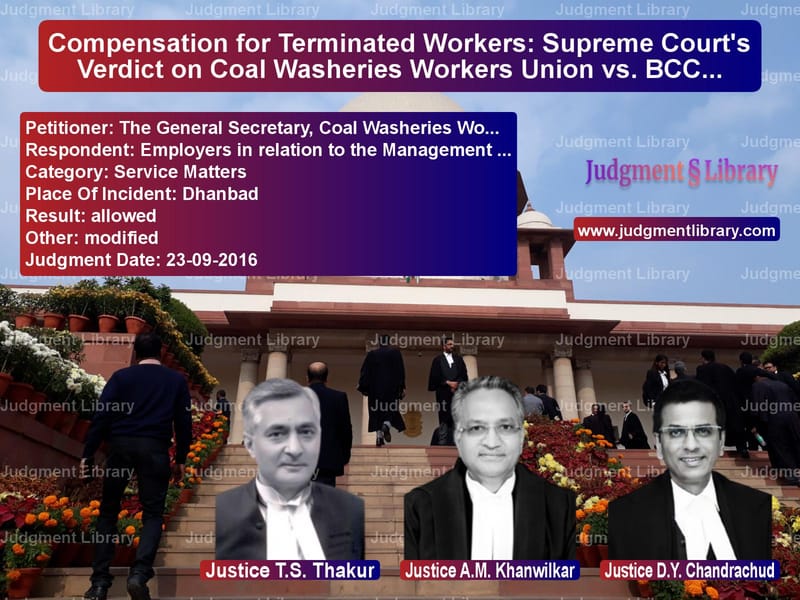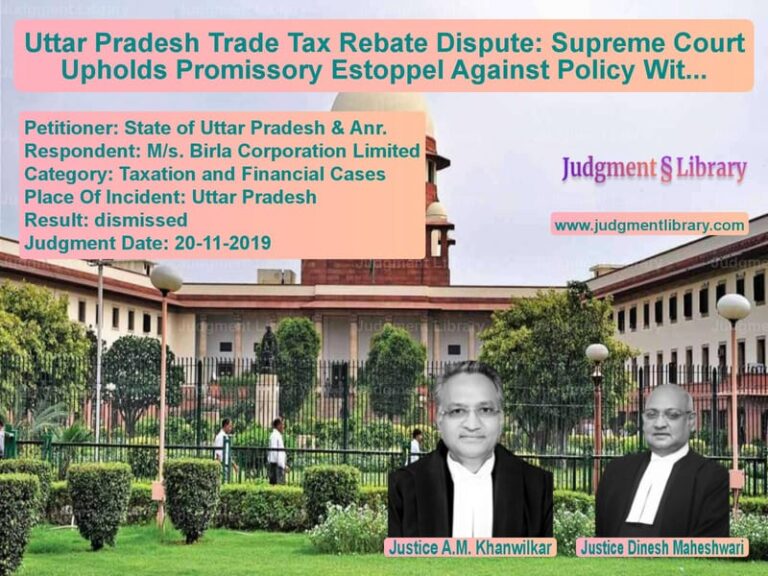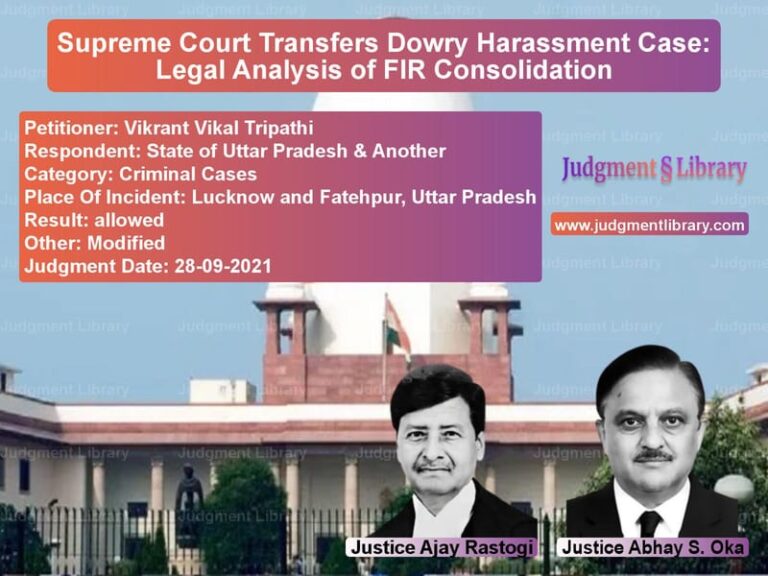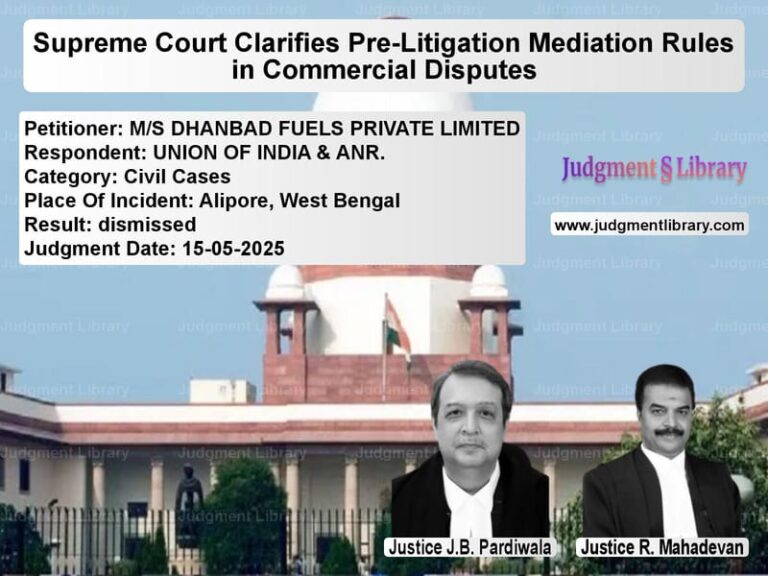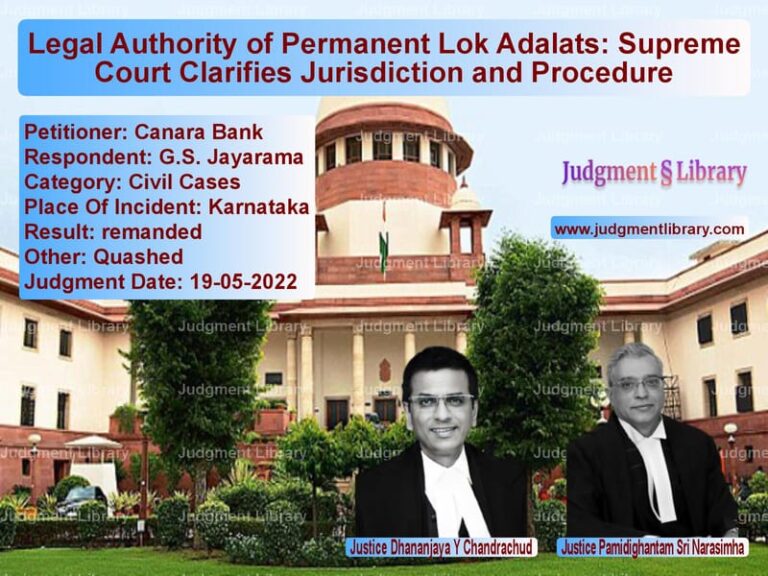Compensation for Terminated Workers: Supreme Court’s Verdict on Coal Washeries Workers Union vs. BCCL
The Supreme Court of India ruled on a significant labor dispute in the case of The General Secretary, Coal Washeries Workers Union vs. Employers in relation to the Management of Dugda Coal Washery of M/s BCCL. The case addressed the issue of whether 35 workmen, previously employed by a contractor at Dugda Coal Washery, should be regularized as employees of Bharat Coking Coal Limited (BCCL) and the quantum of compensation they should receive in lieu of reinstatement.
Background of the Case
The dispute originated when 35 workmen, employed by a contractor (M/s Triveni Engineering Works) at Dugda Coal Washery, claimed they should be treated as direct employees of BCCL. The matter was referred to the Central Government Industrial Tribunal (CGIT), Dhanbad, which ruled in favor of the workers and directed BCCL to reinstate and regularize them with effect from July 1, 1990, along with 30% back wages.
BCCL challenged the tribunal’s award before the Jharkhand High Court. While the Single Judge upheld the tribunal’s findings, the Division Bench modified the ruling, stating that reinstatement after over 20 years was inequitable. Instead, it awarded a lump sum compensation of Rs. 50,000 per worker in addition to the wages already received under Section 17(B) of the Industrial Disputes Act, 1947.
The workers’ union appealed to the Supreme Court, seeking an increase in compensation.
Key Legal Issues
- Should the 35 workers be regularized as BCCL employees?
- Was the decision to award lump sum compensation instead of reinstatement justified?
- Was the compensation amount (Rs. 50,000 per worker) adequate?
- Should interest be awarded on the compensation amount?
Arguments Presented in Court
Arguments by the Workers’ Union:
- The tribunal correctly ruled that the workers were employees of BCCL and not just contractual workers.
- Reinstatement was the appropriate remedy, as termination was illegal.
- The compensation amount of Rs. 50,000 per worker was inadequate given the long period of unemployment.
- The workers should receive a fair settlement, including interest on the compensation amount.
Arguments by BCCL:
- The workers were engaged through a contractor and were never directly employed by BCCL.
- Reinstating workers after 20 years was impractical and inequitable.
- The amount of Rs. 50,000 per worker was reasonable considering the circumstances.
- The workers had already received wages under Section 17(B) of the Industrial Disputes Act.
Supreme Court’s Observations
The Supreme Court acknowledged the difficulties in reinstating workers after a gap of over 20 years. However, it emphasized the need to ensure fair compensation. The Court observed:
“Considering the facts of this case, an order of reinstatement must be eschewed as being inequitable. However, the workmen must be compensated in lieu of reinstatement.”
The Court referenced previous cases such as Ruby General Insurance Co. Ltd. vs P.P. Chopra (1969) and Delhi International Airport (P) Ltd. vs Union of India (2011) to determine a just compensation amount.
The Court ruled:
“In our considered opinion, interest of justice would be met by enhancing the compensation in lieu of reinstatement to Rs. 1,50,000 per workman.”
The Supreme Court also clarified that the compensation amount would be final and no further inquiries into the workers’ employment status during the intervening period would be required.
Final Judgment
The Supreme Court modified the Jharkhand High Court’s judgment as follows:
- The lump sum compensation was increased from Rs. 50,000 to Rs. 1,50,000 per worker.
- The amount had to be deposited with the Central Government Industrial Tribunal, Dhanbad, within three months.
- Failure to deposit the amount within the stipulated period would attract 10% interest per annum until the payment was made.
- The tribunal would oversee the disbursement of the compensation.
Implications of the Judgment
This ruling has significant implications for labor rights and industrial relations:
- Fair compensation principle: Even if reinstatement is not feasible, terminated workers must receive adequate compensation.
- Employer accountability: Companies engaging contract workers can be held accountable for their long-term welfare.
- Judicial balance: The ruling demonstrates a balance between workers’ rights and practical business considerations.
- Strengthening industrial dispute resolution: The decision reinforces the role of industrial tribunals in ensuring fair settlements.
Conclusion
The Supreme Court’s ruling in The General Secretary, Coal Washeries Workers Union vs. BCCL sets an important precedent for labor disputes. By increasing compensation for the affected workers while acknowledging the impracticality of reinstatement, the Court has struck a balance between justice and feasibility. The case highlights the need for timely resolution of industrial disputes and underscores the principle that no worker should be left uncompensated for wrongful termination.
Don’t miss out on the full details! Download the complete judgment in PDF format below and gain valuable insights instantly!
Download Judgment: The General Secretar vs Employers in relatio Supreme Court of India Judgment Dated 23-09-2016-1741883819263.pdf
Direct Downlaod Judgment: Direct downlaod this Judgment
See all petitions in Employment Disputes
See all petitions in Judgment by T.S. Thakur
See all petitions in Judgment by A M Khanwilkar
See all petitions in Judgment by Dhananjaya Y Chandrachud
See all petitions in allowed
See all petitions in Modified
See all petitions in supreme court of India judgments September 2016
See all petitions in 2016 judgments
See all posts in Service Matters Category
See all allowed petitions in Service Matters Category
See all Dismissed petitions in Service Matters Category
See all partially allowed petitions in Service Matters Category

